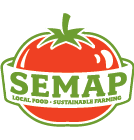From time to time, I’ve been asked by friends, family members, and others along my travels about how they can best support local agriculture. Naturally, buying local is a big part of that. I’ve said it many times, and it seems that the philosophy is really starting to permeate the lives of everyday folks. We have people who are, for lack of a better word, consumers…but they are thoughtful ones, and they want to make better, healthier choices.
But what does “buying locally” mean? Well, it means different things to different people but, ultimately, it’s about making thoughtful choices. And that leads us to our first way in which we can support agriculture:
1) Ask Questions
It’s easier to source foods at markets, but a bit more challenging when you head out to eat. Try to find out where your favorite restaurants’ food comes from. Of course, we can’t all afford to grow tomatoes indoors, but there are plenty of items available for local restaurants to purchase that are sourced locally, even in the dead of winter. Beef, poultry, pork and dairy come to mind. My favorite restaurants are the ones that tell me from what farm their vegetables, dairy, or meats come. It helps me build a connection with local agriculture, and I’m sure that the restaurant owners have noticed it is good business for them as well. When you see a farm name attached to an ingredient, your meal ceases to be something hastily produced and becomes something familiar and comforting. More and more restaurants are being proactive about waving the “buy local” banner, and I’m sure more will follow. As a customer, a polite inquiry certainly couldn’t hurt.
2) Get Involved
There are volunteer opportunities across southeastern Massachusetts to help, whether it’s during the harvest, preparing fields, or helping with modest repairs or clean up. Sometimes, volunteers can earn a share of what’s harvested. Even if there isn’t a free basket of veggies waiting, putting in a few honest hours a week on the farm is reward enough. As we approach the Spring, we’ll do our best to get the word out on any volunteer opportunities available.
3) Support SEMAP!
SEMAP is quite a remarkable resource for farmers and consumers, and I think it’s also been an excellent conduit to bridge the two. We will continue to work to that end, through existing programs, but also will continue to explore new and innovative methods. We could use your help. Become a member, make a donation, and/or attend an event. Our signature event, the 8th Annual Ag and Food Conference, is coming up, and there will be something for everyone. Please join us and tell us you like what we’re doing!
4) Pass It On
Buying local, for a multitude of reasons, is important to you and it’s important to me. As someone who has just turned 40, my health and the health of the environment around me is probably more important to me now than it has ever been in my life. Growing up in an urban environment and playing as a child amongst the ruins of demolished shoe factory, I never thought much about farms. I wish I had. Now that I am keenly aware, it’s incumbent upon me, as it is incumbent upon you, to pass on that awareness, that passion and that love for local agriculture.
My children will never forget the first pumpkin we grew together, will never forget our regular trips to Alderbrook Farms to visit the animals and buy some local produce, and will always try to butter their father up by telling me they think my tomatoes are far tastier than the kind you find at the supermarket in the dead of winter. They understand now where food comes from, and I hope they continue to understand.
Building that understanding of agriculture at an early age breeds a lifelong appreciation of agriculture. So, if you have school-age children, ask the school about possible field trips to a farm. Or bring them yourself. Also, if you know someone with children who isn’t as engaged, tell them to check out a local farm if they’re looking for something to do. While some farms are not equipped for a van or bus-full of kids, some are. Always feel free to check our website for information on farms, and you’re welcome to send us questions too.
There’s a saying that’s apt here: “We do not inherit the Earth from our ancestors; we borrow it from our children.” Simply buying local isn’t enough. We need to spread the gospel far and wide, and help people come to the same realization we have all accepted: local agriculture depends on our support, and we depend upon local agriculture too.
